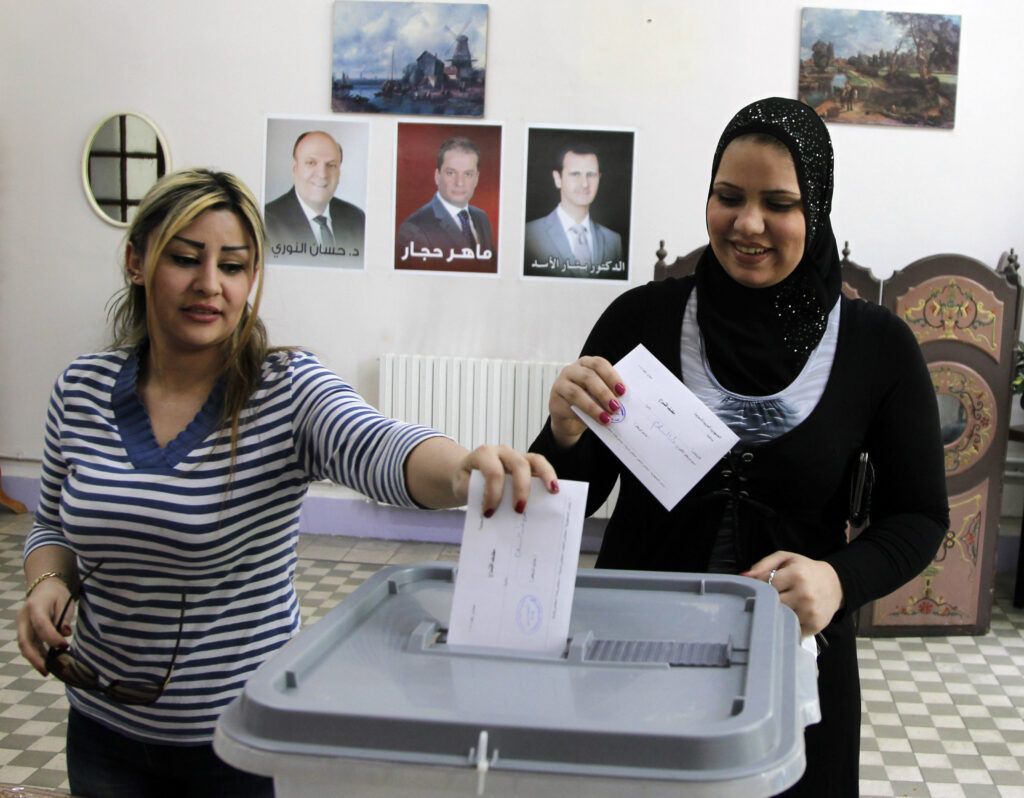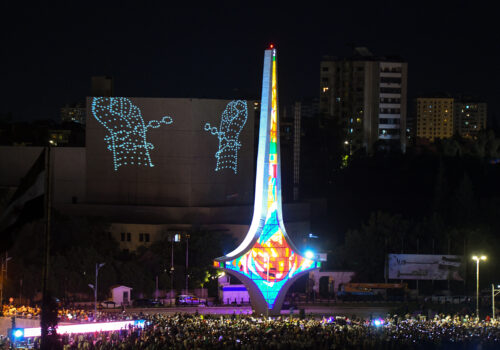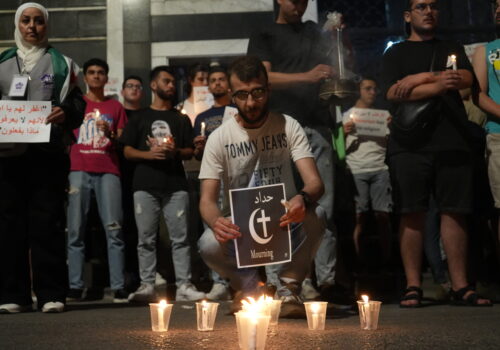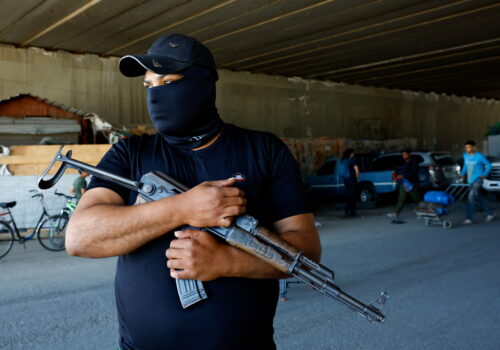In landmark Syria elections, women still face electoral hurdles
Syrians are about to complete a new and important step of the country’s transition after the overthrow of Bashar al-Assad’s regime last year: the formation of a transitional legislative assembly. The indirect electoral process is expected to be completed by the end of September.
The stakes are high because during their two-and-a-half-year renewable mandate set by the Constitutional Declaration adopted in March, the new parliament members will be tasked with passing laws that will shape the reconstruction and the new direction of the country. Therefore, it is crucial that all the components of the Syrian society are represented. According to the electoral framework, there will be “at least 20 percent of women” in the total of all the electoral committees. This provision has revived the discussion about the need for increased women’s inclusion in decision-making in Syria.
Under Assad, women made up only 10 to 12 percent of the members of parliament between 2007 and 2022, according to a report by the Syrian non-governmental organization (NGO), Musawa. Women’s participation was even lower at the local level, where they accounted for 2 percent of the members of local and municipal councils in 2011, reaching 11 to 12 percent in 2022, the organization found.

Since the fall of Assad, progress regarding women’s political participation has been limited. The interim government includes only one woman Minister. The Preparation Committee for the National Dialogue and the Constitutional Drafting Committee—transitional bodies tasked with completing milestones of the transition—both included two women out of seven members (30 percent). However, women accounted for approximately 20 percent to 25 percent of the participants in the National Dialogue Conference held in Damascus in February 2025, according to my conversations with organizers and participants.
Traditions and conservative social norms have hindered Syrian women’s political participation, despite their involvement in the 2011 revolution and during the war. Based on my conversations with women activists throughout Syria last spring, the requirement of joining the former governing Ba’ath Party and the fear of being associated with the corruption of the regime also deterred women from participating in politics under Assad. Therefore, the current transition offers an opportunity for women, despite the resistance of conservative parts of Syrian society and the authorities themselves.
SIGN UP FOR THIS WEEK IN THE MIDEAST NEWSLETTER
Yet, the complicated mechanism designed for these indirect elections does not favor women’s inclusion. The Supreme Committee for the People’s Assembly Elections, which oversees the process, appointed Election Sub-Committees in each of the sixty-two electoral districts. Only 11 percent of the appointed members of the Election Sub-Committees are women (twenty out of 179). Election sub-committees are in charge of appointing a fifty-member Electoral Body for each seat allocated to the electoral district. On election day, approximately six thousand members of the Electoral Body will elect 120 members of parliament from their ranks. There are 140 seats open for the election, but the government has decided to postpone voting in Suweida, in parts of Raqqa and Hasakeh provinces, officially because of security concerns. In reality, the government does not control these parts of the country. In addition, the President will directly appoint a third of the assembly by selecting an additional seventy members.
Research shows that women are less likely to be elected in majoritarian systems, whereas they do better in proportional representation elections. Majoritarian systems, such as the Syrian People’s Assembly indirect election system, favor the dominant groups, including notables and community leaders, who are usually men.
For this indirect election, the first challenge for women is to be selected for the Electoral Body, which will be made up of one-third of notables (overwhelmingly men) and two-thirds of professionals and academics. Then, women need to put themselves forward as candidates among their peers of the Electoral Body. Last but not least, women have to win the majority of the votes of the members of the Electoral Body.
Therefore, it is very challenging for women to become members of the new assembly, even more so for women from minority groups. While the announcement of a 20 percent quota is a positive, albeit modest, step, the electoral decree specifies that it applies to “the total of all the electoral committees” and not to each Sub-committee and to each Electoral body. In order to enhance women’s participation in decision-making, Syrian civil society organizations have launched a campaign calling for a 30 percent quota for women in each committee involved in the electoral process, as well as in the People’s Assembly.
Syrian officials have privately said, according to a trusted secondary source who spoke to me on background, that President Ahmed al-Sharaa’s appointment of one-third of the members of the assembly will present an opportunity to fill gaps once the vote is completed. But this opaque and discretionary procedure cannot be a reliable solution to counter the barriers to women’s participation.
Across the wider Arab region, women represent an average of 17.7 percent of parliament membership. Several countries, including Iraq, Egypt, Saudi Arabia, and Jordan, have adopted electoral quotas or reserved seats for women, ranging from 14 percent to 50 percent. For instance, in 2019, the United Arab Emirates issued a decree providing for a 50 percent electoral quota for women, and it has since reached parity in its Parliament, whereas no women were sitting in the assembly in 2006.
As the indirect electoral process has started, the Syrian authorities and civil society could take several steps to increase women’s chances in this process. First, it is crucial to inform women about the election mechanism and encourage them to ask to join the Electoral bodies. Civil society organizations are leading the awareness effort, but it is challenging for them to reach all the districts, and they should be supported. Second, when the preliminary lists of members of the Electoral bodies are published, civil society activists should advocate to increase the number of women in the final list. Third, civil activists and women’s organizations should raise awareness among members of the Electoral bodies of the need for fair representation of women in the assembly.
The task is daunting in such a short time frame, but the stakes are high. Building a political system that guarantees the representation of all, including women from all communities, and equal rights, will significantly determine the success of the transition, as inclusion is the main way to ensure a durable peace.
Marie Forestier is a nonresident senior fellow for the Syria Project in the Atlantic Council’s Middle East programs. She is also currently a consultant for the European Institute of Peace and the co-director of the Syria Strategy Project.
Further reading
Thu, Sep 4, 2025
Dispatches from Damascus: The state of Syria’s postwar transition nine months after Assad’s fall
New Atlanticist By
On a recent trip to the Syrian capital, Atlantic Council experts took note of how far the country has come since the Assad regime’s fall and what still needs to happen to secure peace and prosperity.
Mon, Aug 25, 2025
Dispatch from Syria’s Christian strongholds: A new government, a full political spectrum
MENASource By
The conditions of Christian communities across the country remain varied, with the opinions of religious and community leaders deeply mixed.
Thu, Jul 24, 2025
In a sectarian Syria, the winners should refrain from taking all
MENASource By Marie Forestier
To avoid the complete supremacy of HTS-supporting Sunnis, it is crucial to adopt power-sharing mechanisms ensuring inclusiveness
Image: August 31, 2025, Damascus, Damascus, Syria: Syrian security personnel conduct visitor inspections at the Damascus International Fair, ensuring safety and security during the first edition held after the fall of the Assad regime. (Credit Image: © Mohammad Bashir Aldaher/ZUMA Press Wire)



